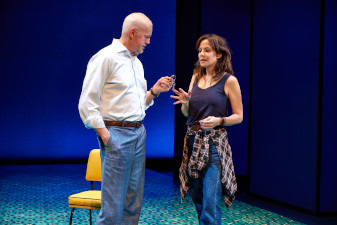
Paulanne Simmons
“How I Learned to Drive” is a Lesson Waiting to Be Taught.
How I Learned to Drive “How I learned to Drive” is about a young girl’s adolescent sexual relationship with her uncle, with driving serving as the play’s unifying metaphor. The audience knows this from the very beginning of Paula Vogel’s play, now in revival at the Manhattan Theatre Club, with Mary-Louise Parker as Li’l Bit and David Morse as her Uncle Peck. And the audience knew it when the show premiered in 1997 at the Vineyard Theatre with Parker and Morse playing the same roles. The rest of the play, told in a series of memory scenes in an order that is neither chronological nor thematic, adds details that are often uncomfortable, occasionally funny, sometimes even achingly poetic. Li’l was born into a family obsessed with sex. Thus, her mother is known as the “Titless Wonder.” Her cousin has been nicknamed “Blue Balls.” And her grandfather is called “Big Papa,” not because he is particularly tall. Despite her thrice-daily trysts with Big Papa, Li’l Bit’s grandmother doesn’t believe there is such a thing as an orgasm and scorns the idea of a “G Force.” She reminds Li’l Bit’s mother that it was her promiscuous ways that got her into trouble when she was young. Many of the details are inconsistent. Li’l Bit feels uncomfortable about the relationship but never really tries to end it or even stop putting herself into situations when she will be alone with Uncle Peck. Uncle Peck’s wife, Aunt Mary, knows and her mother suspects there is something not quite kosher about Li’l Bit and Uncle Peck’s relationship. What’s more, her mother even cautions her against being alone with her uncle, but Li’l Bit is never troubled enough to ask her mother for help. One scene shows us that Li’l Bit actually initiated a close relationship with her uncle, but it is not clear whether she knew that relationship would become sexual. Nor is it clear if Uncle Peck has done more than putting his hands where they should not go. Why does Uncle Peck have such a hold on Li’l Bit, even though she is clearly traumatized by their relationship? The play hints that he is less brutal than the other people who surround Li’l Bit. But surely that is not enough to make her tolerate his abuse. And we know he is the only one who supports her college plans. But by that time Uncle Peck has been abusing his niece for years. The non-linear format of “How I Learned to Drive” does not let us see the progression of the relationship. Instead, it gives us pieces of the puzzle and asks us to put the puzzle together, despite the fact that a good deal of the pieces are missing. For all these reasons, despite the show’s many sterling reviews and its Pulitzer Prize, the play left this reviewer cold for the most part. This, however, does not mean the revival, directed by Mark Brokaw, with a set by Rachel Hauck (who, for some reason, does not make much of an attempt to reinforce driving as the central image of the play), does not have merit. Parker clearly understands the ambivalence and impulsiveness of youth, even if this is not quite enough to make her portrayal thoroughly convincing. And the Greek Chorus playing the supporting roles (Johanna Day, Alyssa May Gold and Chris Myers) adds enormously to the show’s humor. Morse might have had an easier task portraying Peck if Vogel had given him a chance to explain himself. Aunt Mary tells us he is struggling. But the only time we hear him speak for himself is in his address to the offstage Cousin Blue Balls during a fishing trip. In fact, this monologue undermines any sympathy we might have for Peck, when it becomes apparent Peck is going to molest his nephew in the same way he is molesting his niece. Vogel has been quoted as saying her inspiration for “How I Learned to Drive” was Vladimir Nabokov’s novel, Lolita, about a sexual predator she somehow found herself sympathizing with. If her goal was to make Peck similarly sympathetic, it would be interesting to find out how many people didn’t find Morse either creepy or ridiculous. When, at the end of the play, we are told of Peck’s untimely alcoholic death, I couldn’t keep myself from muttering, “Good!” “How I Learned to Drive” is a brave and difficult piece that explores forbidden desires and abominable acts. But, after seeing it, we leave the theater none the wiser. |
| recordings | coupons | publications | classified |

